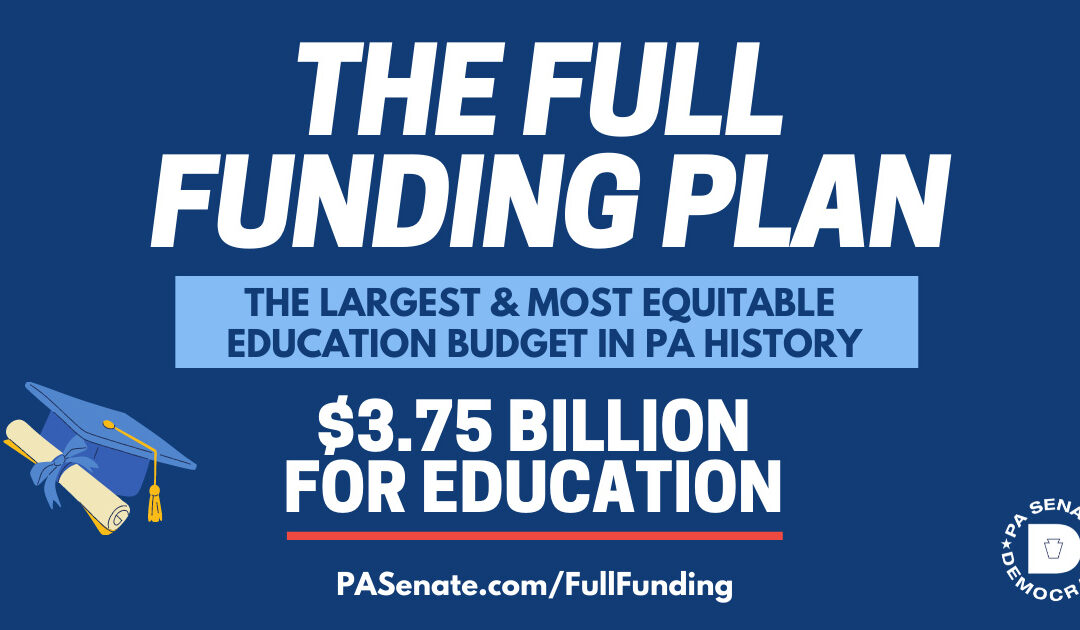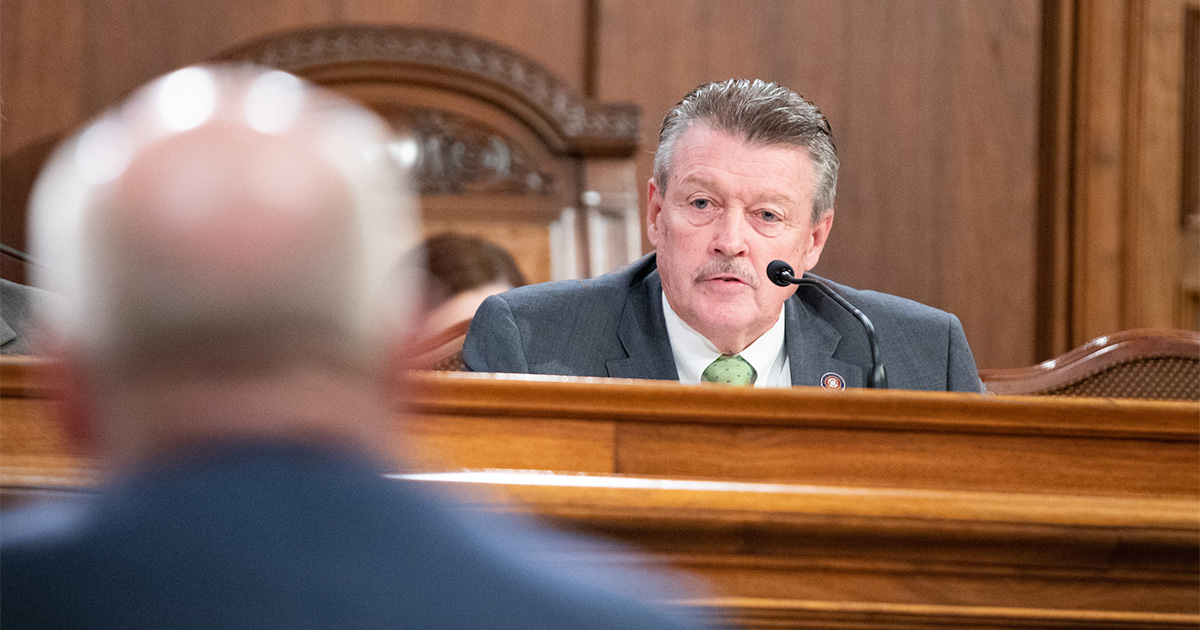
January 31, 2022
Harrisburg, January 31, 2022 – State Sen. Jim Brewster today stood with colleagues in the House and Senate to announce a school budget plan that would represent the largest investment in public education in Pennsylvania history.
The $3.75 billion outline, dubbed the Full Funding Plan, would take advantage of an expected $6 billion year-end state revenue balance to address generational inequity, crumbling school infrastructure and staffing problems exacerbated by the pandemic.
Brewster, who sits on the PA Senate Education Committee and the PA Commission on Crime and Delinquency’s School Safety and Security Committee, said inadequate school funding and disinvestment in struggling communities are at the root of numerous costly social problems.
“We can’t effectively address crime or violence without investing in struggling schools and closing the opportunity gap in education,” he said. “In many neighborhoods the school is the safe haven and the resource of first choice for disadvantaged families. This plan is an opportunity to truly create the ‘thorough and efficient’ system of public education that our constitution requires.”
The plan would make significant additional investments in the following areas:
- $1.1 billion into the Fair Funding Formula
- $750 million into Level Up (targets 200 districts with the most inequitable funding, and largest adequacy gap)
- $1.1 billion into school facilities
- $250 million into historic staffing problems
- $125 million into mental health supports
- $100 million into academic supports
“We are confident in the sustainability of this plan because Pennsylvania is experiencing an unprecedented revenue surplus due to a huge economic turnaround aided by federal investments,” said State Sen. Vincent Hughes, Democratic Chair of the Senate Appropriations Committee. “There can be no more excuses for toxic schools and inequality of opportunity. We are sitting on the largest pool of unspent funds in Pennsylvania history.”
Hughes said state revenues are on track to outperform estimates by well over $2 billion, while nearly $2.2 billion of American Rescue Plan funds remain unused.
“The time is now. The time is right,” said Sen. Jay Costa, the Democratic Leader. “The resources are there, and its incumbent upon all of us to really make a significant statement on the steps we need to take to adequately fund public education.”
Pennsylvania’s strong revenues combined with federal assistance will result in a year-end balance of well over $6 billion.

March 13, 2019
Harrisburg – March 13, 2019 – A new plan to use revenue generated from an energy extraction tax to provide school funding, safety investments and environmental protection initiatives will soon be introduced by state Sen. Jim Brewster (D-Allegheny/Westmoreland).
“The ability to use a responsible energy extraction tax to fund worthwhile initiatives in education and environmental protection creates opportunities without undue burden on the industry,” Brewster said. “My plan not only invests revenue from a shale tax into basic education and school safety initiatives, it would also release millions to pay for new pipeline and safety inspectors, plus fund environmental cleanup.
“The plan would not affect the impact fee payments that now go to local governments.”
Brewster said his plan would place a five percent severance tax on the value of gas extracted at the well head. While the local impact fee would remain in place, gas drillers could deduct what they pay in impact fee monies against what severance taxes they owe.
The McKeesport lawmaker said the extraction tax would raise approximately $502 million per year. Minus the $230 million in impact fee payments to local governments, the remaining $272 million would be evenly split between education and environmental protection initiatives.
“Tying extraction revenue to specific uses ensures transparency and validates the tax,” Brewster said. “Revenue generated will not be wasted.”
Brewster said the estimated $136 million raised for education would be used to increase subsidies to public schools and improve school safety and security. He said the increased subsidy payments could help local school boards reduce or hold the line on property taxes.
The other $136 million would pay for a concerted effort to improve pipeline safety and address environmental issues. Ten percent of allotted environmental funds would be used to facilitate more pipeline safety inspectors. Another 10 percent would be earmarked towards increasing staffing at the Pennsylvania Department of Environmental Protection (DEP). Eighty percent of environmental funding would be used for various environmental cleanup programs across the state.
Brewster has introduced a version of the plan in previous sessions. In the 2015-2016 session, he authored Senate Bill 395.
-30-
October 16, 2015
Harrisburg – Oct. 16, 2015 – Mon Valley lawmakers are demanding that the PA Department of Education halt the scheduled payment of state funds to charter schools and cyber-charters until state funds are first paid to public schools or a more equitable distribution formula is developed.
State Sen. Jim Brewster (D-Allegheny/Westmoreland), Reps. Marc Gergely (D-Allegheny) and Bill Kortz (D-Allegheny) said they have asked for a meeting early next week with Education Secretary Pedro Rivera to formally request a better handling of the matter.
“Public schools are facing incredible difficulties because of the lack of a state budget,” Brewster said. “Now, the little funding they are getting outside of the basic subsidy is being hijacked by charter schools.
“The fact that charters are moving ahead of public schools is ridiculous.”
Charter schools are slated to receive a disbursement next week from funds generated from gaming revenues. Normally, funding for charter schools is deducted from basic education subsidies. However, as a result of the budget impasse the basic funding stream is not available. Since those funds are not available, the funds are then deducted from other state payments.
“Schools in the Mon Valley are facing hardship and financial stress and are struggling to stay open until a budget is finalized,” Kortz said. “During a budget impasse, it is ludicrous that any funds would be deducted from payments for public schools before they receive their subsidy payments.”
According to figures released by the McKeesport Area School District, they were slated to receive $1.2 million in property tax relief payments. Charter schools are slated to take $1.17 million leaving McKeesport with $41,000. Clairton reportedly is set to lose more than $230,000 in gaming reimbursements to charters.
“It is hard to believe that public schools could be dealt another blow in a state budget impasse,” Gergely said. “Public schools should not have to stand behind charter schools in the payment line.
“This is an extraordinary situation and the fiscal pain that school districts and taxpayers feel should not be made worse by taking away funds and giving them to private schools.”
Brewster said that given the exceptionally difficult financial times brought on schools by the budget impasse, PDE should suspend the disbursement of funds to charters and cyber-charters until all school districts understand how payments are processed.
“State statutes that cover the distribution of funds to schools are clearly not equipped to deal with equity issues when there is an extended budget dispute,” Brewster said. “We need to look at these laws as part of a comprehensive review.”
He said that he would work with Kortz, Gergely and other lawmakers on legislation to ensure that this situation does not happen in the future and that public schools are protected.
-30-
Contact: Tim Joyce
Phone: 412 380-2242
Email: tjoyce@pasenate.com
June 14, 2012
Monroeville, June 14, 2012 — Education experts, labor leaders, area school administrators and school board members today laid out disastrous financial problems at a state Senate hearing on the impact of state public school funding cuts.
Held at Sen. Jim Brewster’s (D-Allegheny/Westmoreland) request, the hearing was aimed at gaining a better understanding of how state funding cuts are impacting schools and taxpayers. Testimony was also offered on ways to raise additional revenues or establish greater school efficiencies.
[hdvideo id=15 ]
“Despite the proposed state subsidy restorations, area school boards continue to struggle with dire financial challenges that have resulted in curriculum cutbacks, teacher lay-offs and steep local property tax hikes,” Brewster said. “This discussion enabled local school officials and educational experts to weigh in on their funding challenges, and ways we can adequately and reliably fund our public schools.”
Sen. Lisa Boscola (D-Northampton/Lehigh/Monroe), who chairs the committee, added, “As we finalize the state’s budget in the days ahead, school funding will be one of more crucial and controversial issues. Gaining input from school board members and administrators across the state who are actually in the trenches struggling with funding shortfalls will be invaluable to us.”
In his testimony, Sen. Andrew Dinniman (D-Chester/Montgomery), who serves as Democratic chair of the Senate Education Committee, said the state now provides $352 million less for public schools than it did in fiscal 2008-09. He said less state support has translated into higher property taxes, an “onerous tax that takes no measure of true wealth or income.”
He added that the Corbett Administration’s school funding shortfalls are leading children from “the school door to the prison gate,” will fail to prepare our children for the new world economy and threaten to “destroy Pennsylvania’s ability to compete economically for decades into the future.”
All of the area superintendents and school board members who testified sharply criticized the Corbett Administration’s education policies. Many predicted that a growing number of schools would soon be facing deficits and on the brink of financial collapse. Many pointed to dwindling state subsidies, unfunded mandates and being cornered into annually hiking property taxes, furloughing teachers and cutting educational programs.
Michael Crossey, president of the Pennsylvania State Education Association, told the senators there are very few incentives for young people to go into the teaching profession these days because of the widespread funding uncertainty and lack of respect for teachers.
Boscola commended Brewster for his “unrelenting efforts to find additional revenue sources to supplement stagnant school subsidies.
Last year Brewster introduced legislation that would dedicate half of a 7 percent natural gas drilling fee for public school funding. The bill would generate $280 million annually, but majority Republicans have buried the proposal in a senate committee.
In both of his first two years in office, Gov. Corbett proposed steep educational funding cuts in his budget proposals. Last year, the governor proposed cutting $1.1 billion before the legislature restored $200 million. This year, the senate version of the budget bill would level fund public school funding by restoring an additional $100 million. Boscola predicted that this year’s budget will be finalized in the next week or two.
Brewster said many school districts cannot absorb huge state funding cuts with growing personnel costs, rising energy and physical plant costs and skyrocketing employee pension costs.
“While the Corbett Administration boasts about holding the line on state taxes, they have fostered a tax shifting shell game that leaves our schools, students and taxpayers out on a limb,” Brewster said. “Our kids deserve an opportunity for a good education, not some cut-rate abbreviated mishmash that does little more than sound good in right wing stump speeches.”
Joining Boscola, Brewster and Dinniman at the hearing were Democratic Leader Jay Costa (D-Allegheny), and Senators Wayne Fontana (D-Allegheny), Vincent Hughes (D-Phila.), Rich Kasunic (D-Fayette/Somerset), and Tim Solobay (D-Washington).
Those who testified included: Senator Andrew Dinniman, Democratic Chairman of the Senate Education Committee;Michael J. Crossey, president of the Pennsylvania State Education Association (PSEA); Robert Pallone, president of the New Kensington-Arnold School District School Board; Richard P. Livingston, president of the Clairton City School District Board of Directors; Marilyn Messina, president of the Woodland Hills School District Board of Education; Dr. George Batterson, superintendent of the New Kensington-Arnold School District; Dr. Bart Rocco, superintendent of the Elizabeth-Forward School District; and Dr. Michael Panza, superintendent of the Sto-Rox School District
# # #


